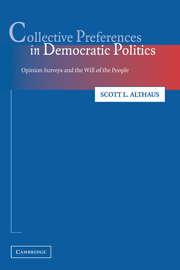Book contents
- Frontmatter
- Contents
- List of Figures and Tables
- Acknowledgments
- 1 Introduction
- PART I ILLUSIONS OF AGGREGATION
- PART II INFORMATION EFFECTS IN COLLECTIVE PREFERENCES
- 4 The Impact of Information Effects
- 5 The Structure and Causes of Information Effects
- 6 The Temporal Dynamics of Information Effects
- PART III OPINION SURVEYS IN DEMOCRATIC POLITICS
- Appendix A Political Knowledge Indices
- Appendix B Methodology
- References
- Index
4 - The Impact of Information Effects
Published online by Cambridge University Press: 06 January 2010
- Frontmatter
- Contents
- List of Figures and Tables
- Acknowledgments
- 1 Introduction
- PART I ILLUSIONS OF AGGREGATION
- PART II INFORMATION EFFECTS IN COLLECTIVE PREFERENCES
- 4 The Impact of Information Effects
- 5 The Structure and Causes of Information Effects
- 6 The Temporal Dynamics of Information Effects
- PART III OPINION SURVEYS IN DEMOCRATIC POLITICS
- Appendix A Political Knowledge Indices
- Appendix B Methodology
- References
- Index
Summary
Ever since Marx suggested that workers were imbued with a “false consciousness” that distracted them from their material interests, students of politics have grappled unsuccessfully with the question of how to tell when people's opinions might be at odds with their interests. Some, like Marx and Edmund Burke before him, argue that political interests are objective and can be identified for any group of people without regard to their stated preferences (Balbus 1971; Bay 1965; Lukes 1974). Others, like Rousseau and, in some accounts, the early utilitarians (Cutler 1999; Minar 1960; although see Pitkin 1967: Chapter 9), claim that interests are subjective and thus inseparable from the expressed wishes of individuals speaking for themselves. Much of the theoretical rationale behind citizen referenda and modern opinion polling can be traced back to this subjective view of interests (Minar 1960).
But in light of inherent problems with each of these definitions, recent work has focused instead on interests as “fully informed” or “enlightened” preferences (Bartels 1990; Connolly 1972, 1993; Dahl 1989: 180–1; Delli Carpini and Keeter 1996; Lippmann 1955: 42; Mansbridge 1983: 24–6). In this perspective, as Jane Mansbridge (1983) puts it, interests are revealed in “the preferences that people would have if their information were perfect, including the knowledge they would have in retrospect if they had a chance to live out the consequences of each choice before actually making a decision” (25).
- Type
- Chapter
- Information
- Collective Preferences in Democratic PoliticsOpinion Surveys and the Will of the People, pp. 97 - 144Publisher: Cambridge University PressPrint publication year: 2003



